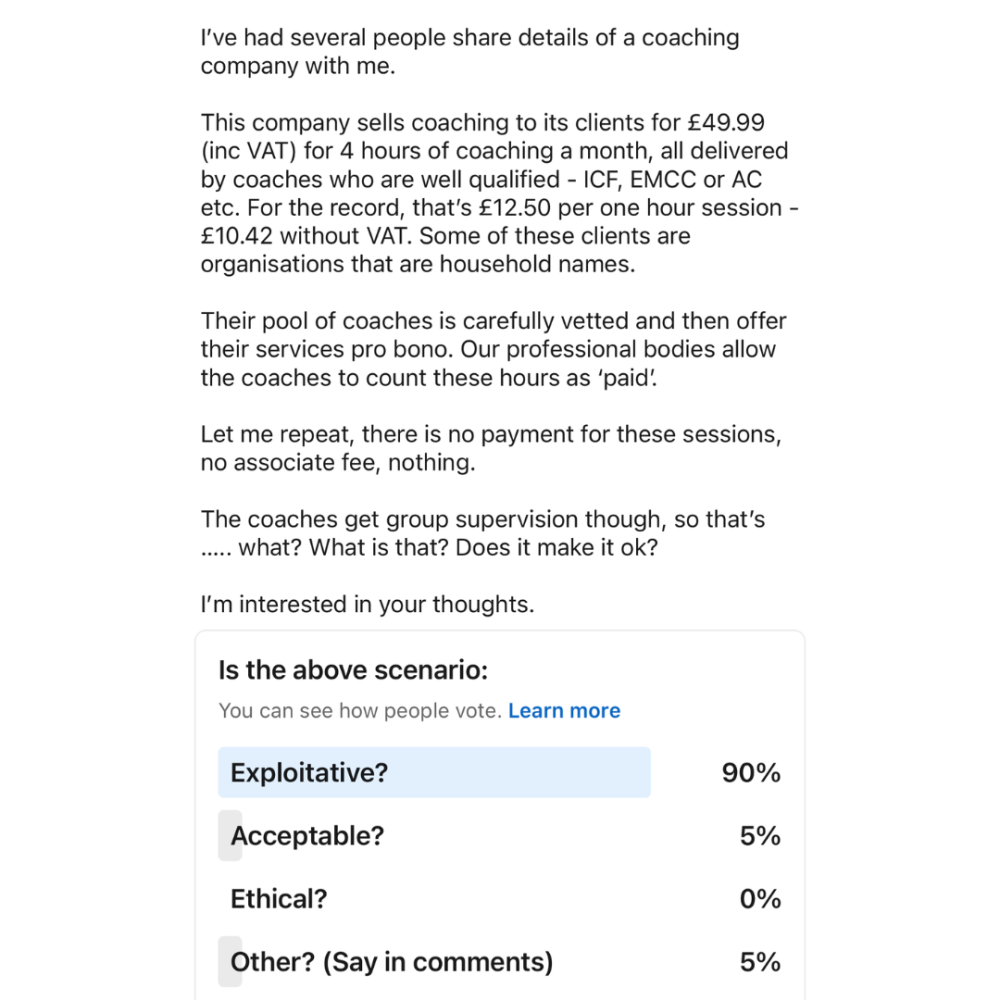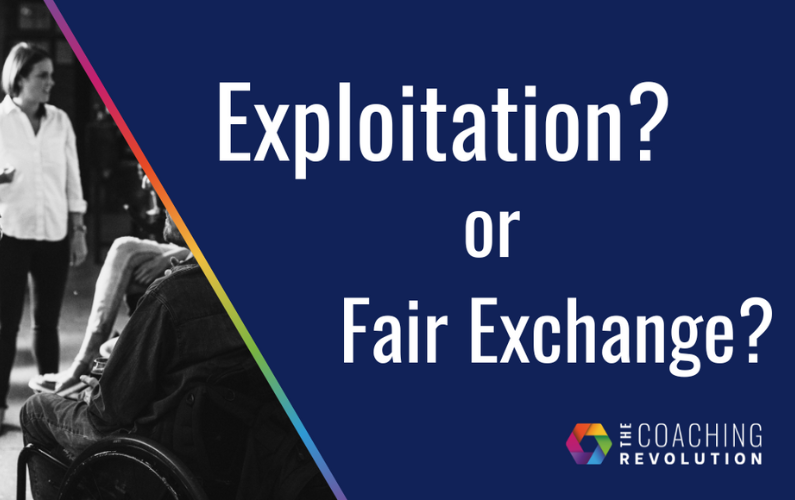Recently, several coaches made me aware of a company that they had discovered. They asked me my opinion of that company. I researched the company, wrote a post on LinkedIn about it, and added a poll.
This is the post and the results of the poll:

The comments on that post are hugely interesting. They include a couple of comments from the sole director of this company.
My Thoughts On This Situation
The fact that I believe that coaching is a force for good and a valuable professional service means that I am going to find that the values of this company clash with mine. I know that this doesn’t mean I’m right and the company’s owner is wrong, but it does mean that I view what she’s doing as devaluing our professional and exploiting the volunteer coaches.
Let me explain why I think this.
If an organisation can buy coaching for £10.42+VAT, why would they pay a professional rate for a coach? Organisational rates for coaching are high and the reason for this is that coaching offers massive value to the company, value that far exceeds the price that they pay for the coach.
If an organisation is paying £10.42+VAT then they know that they are paying less than minimum wage for a professional service – that makes me uncomfortable. Some of the clients this company says they work with include household names – that also makes me uneasy because they should know better if they’re big enough to be household names.
Training to be a coach costs thousands of pounds/dollars/euro and coaches who have taken the time (and the expense) to complete coaching courses have a right to be paid to deliver the service. They have a right to be paid a professional rate.
The owner had written in her LinkedIn profile that she had ‘launched a tech start-up with a unique business model for coaching that takes the price of one-to-one coaching from an average cost of £200 per session to less than the cost of a pizza‘. The coaches in my community were horrified that reducing the price of a professional service to that of a pizza was something worthy of bragging about.
Following the outcry that my post and poll created, the owner removed this comparison.
This Is Not Pro Bono Coaching
I believe that pro bono coaching has its place and that place is an important one.
Pro bono coaching means that people who would never have the opportunity to be coached have that opportunity, and I do not underestimate the impact this can have. (For the record I also believe that pro bono coaching should come after a coach has their financial bases covered.)
However, this isn’t pro bono coaching because the client is paying. The company is being paid, but the coaches are not. I cannot see any way in which this is not exploitative.
It turns out that the company is marketing to coaches who are building their hours for accreditation and that these coaches have, to date, delivered more than 13.5k coaching sessions – all unpaid. The owner says she provides ‘coaching supervision and a supportive environment’ for the coaches to grow in confidence – which is great, but why can’t they be paid too?
Why Do Coaches Get Involved?
There’s a dark underbelly to our profession, and it’s this: We don’t explain clearly to potential coaching students who want to coach for a living, that there are precious few employment opportunities available. Yes, there are coaching platforms like Lyra and BetterUp, but they don’t take every coach who applies, and even when someone is accepted and goes through their training, that doesn’t mean they’ll get coaching work.
As a profession, we also don’t explain that if they’d like to build a coaching business, unless they have existing monetiseable credibility, they will need a complementary skill set alongside their coaching skills. That skill set is client acquisition.
(If you’d like to understand what I mean by existing monetiseable credibility, you can read about it here.)
As coaches don’t realise they need client acquisition skills, their confidence takes a battering when they struggle to find paying clients post-coaching course. They never anticipated that finding clients would be difficult, let alone downright impossible, yet here they are. By the time they reach this point, they are vulnerable, and people take advantage of this.
Whether the advantage that’s taken costs them time or money, it’s still taking advantage. From the ‘6-figures in 90 days’ charlatans that charge tens of thousands of pounds to build a business in 90 days (for the record, they don’t), to the ‘let me sell your coaching but not pay you’ business owners – they are all advantage takers and I feel very strongly about it.
What about you? How do you feel about this?
(If you’re interested in reading the original post and huge number of comments, you can find it here.)

Recent Comments